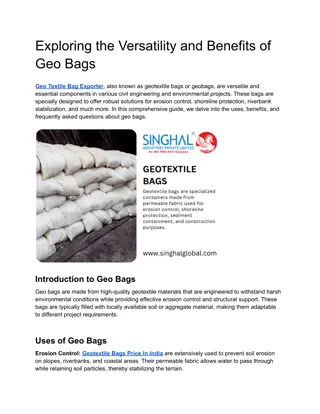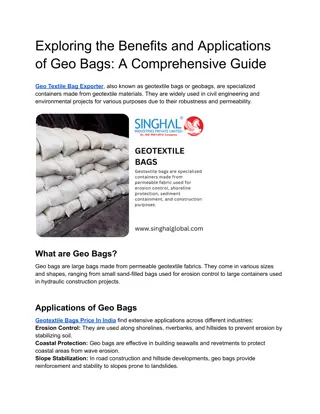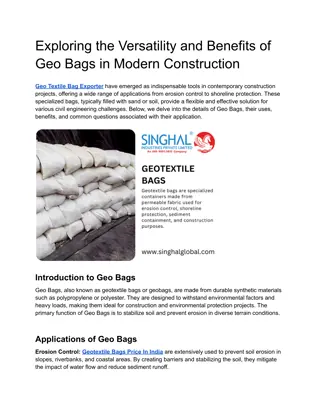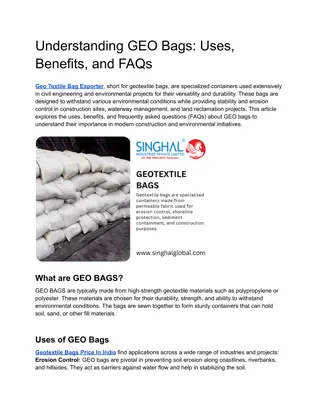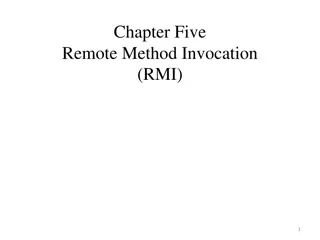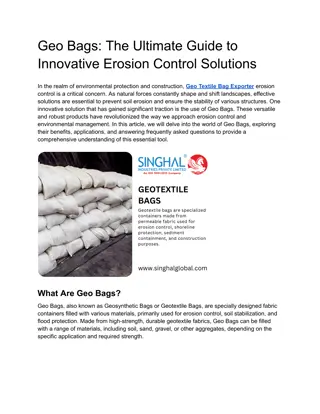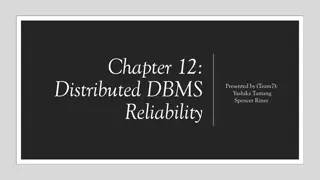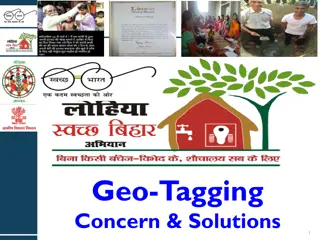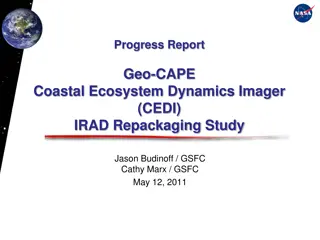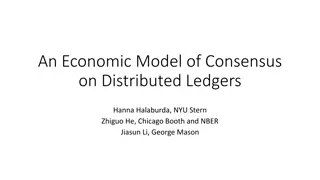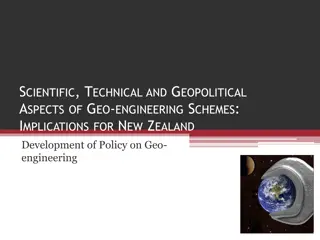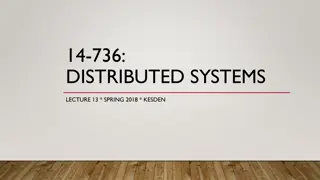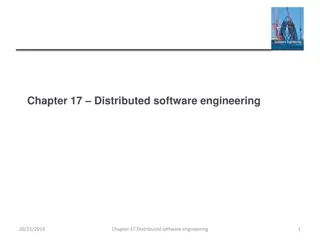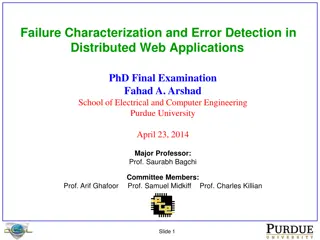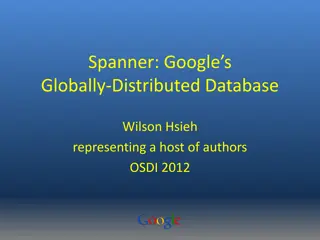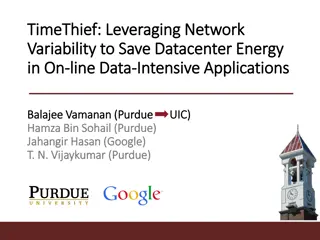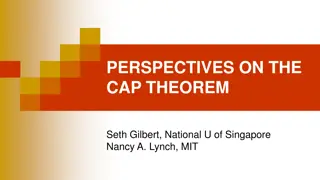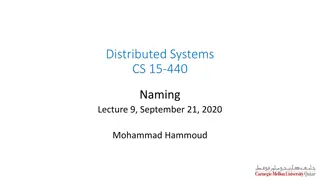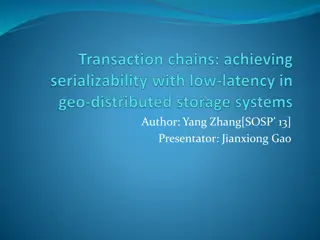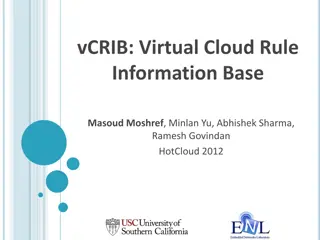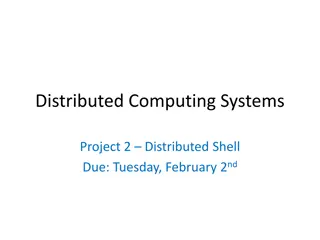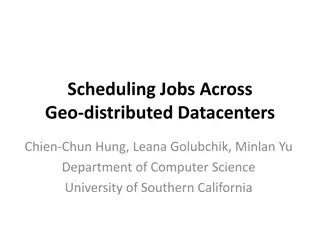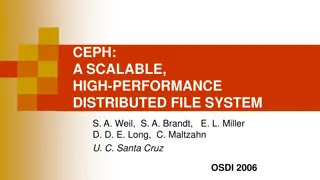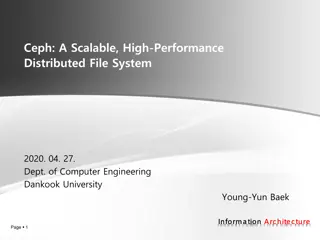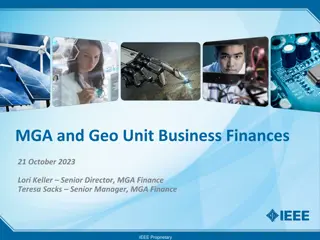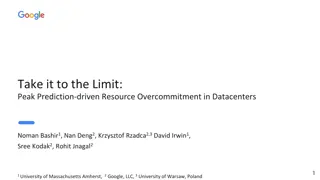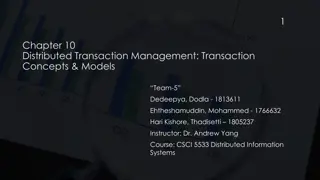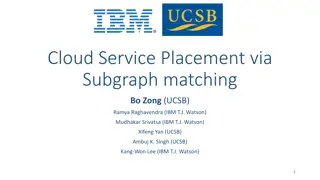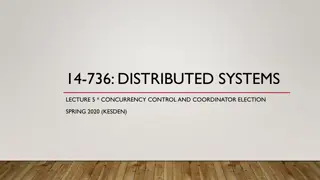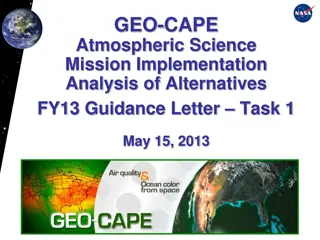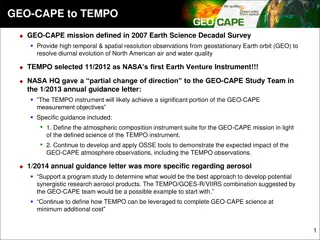Overview of Distributed Systems: Characteristics, Classification, Computation, Communication, and Fault Models
Characterizing Distributed Systems: Multiple autonomous computers with CPUs, memory, storage, and I/O paths, interconnected geographically, shared state, global invariants. Classifying Distributed Systems: Based on synchrony, communication medium, fault models like crash and Byzantine failures. Comp
9 views • 126 slides
Maximizing Efficiency with Geo Bags
From erosion control and slope stabilization to flood protection and land reclamation, Geotextile bags manufacturer offer numerous benefits for infrastructure projects and environmental management initiatives. In this blog, we'll explore how to maximize efficiency with geo bags through thoughtful de
21 views • 4 slides
Global Energy Dynamics: Oil Prices, Geo-politics, and Economic Shifts
Explore the interplay between oil prices, geo-politics, and the global economy in a new paradigm. Key themes include the dominance of fossil fuels, challenges in transitioning to renewables, and the impact of geopolitical events on energy markets. Dive into discussions on the Ukraine war's effects,
4 views • 36 slides
Geo Textile Bag Exporter
At Singhal Industries, we are proud to be your premier Geo Textile Bag exporter, delivering unmatched quality and reliability. Our Geo Textile Bags are engineered to meet diverse industrial needs, ensuring superior strength, durability, and environme
3 views • 3 slides
Geo Textile Bag Exporter
In the realm of geo textile solutions, choosing the right exporter is paramount for project success. Our company stands out as a premier exporter of geo textile bags, offering a diverse range crafted with high-grade materials for durability and envir
0 views • 2 slides
Leading Geo Textile Bag Exporter for Your Global Needs
As a prominent Geo Textile Bag exporter, we specialize in delivering high-quality solutions tailored to global infrastructure projects. Our bags are crafted with precision using advanced materials, ensuring durability and reliability in diverse envir
3 views • 3 slides
Premium Geo Textile Bag Exporter: Quality You Can Trust
As a leading Geo Textile Bag exporter, we pride ourselves on delivering top-notch products that meet international standards. Our Geo Textile Bags are engineered for durability, environmental sustainability, and superior performance in various applic
4 views • 3 slides
Reliable Geo Textile Bag Exporter: Your Trusted Partner
Looking for a dependable Geo Textile Bag exporter? Our company stands out with its commitment to quality and reliability. We specialize in providing high-grade Geo Textile Bags that cater to various industries, ensuring durability and efficiency in e
3 views • 3 slides
Evolution of Data Processing Systems in Geographic Information Science
Data processing systems in Geographic Information Science have evolved from manual, analogue methods to advanced software and hardware components. The incorporation of Geographic Information Systems (GIS) has revolutionized the handling and analysis of geo-referenced data, making tasks like data cap
0 views • 20 slides
Understanding Parallel and Distributed Computing Systems
In parallel computing, processing elements collaborate to solve problems, while distributed systems appear as a single coherent system to users, made up of independent computers. Contemporary computing systems like mobile devices, IoT devices, and high-end gaming computers incorporate parallel and d
1 views • 11 slides
Understanding Remote Method Invocation (RMI) in Distributed Systems
A distributed system involves software components on different computers communicating through message passing to achieve common goals. Organized with middleware like RMI, it allows for interactions across heterogeneous networks. RMI facilitates building distributed Java systems by enabling method i
1 views • 47 slides
Geo Textile Bag Exporter
Geo Bags are essential for environmental protection and erosion control. Made from high-quality geotextile materials, these robust bags are filled with sand or soil and placed strategically to prevent soil erosion, stabilize shorelines, and protect a
2 views • 3 slides
Distributed DBMS Reliability Concepts and Measures
Distributed DBMS reliability is crucial for ensuring continuous user request processing despite system failures. This chapter delves into fundamental definitions, fault classifications, and types of faults like hard and soft failures in distributed systems. Understanding reliability concepts helps i
0 views • 58 slides
Guidelines and Solutions for Geo-Tagging Concerns in Rural Development
Explore essential information and solutions related to geo-tagging in rural development projects. Learn about manpower allocation, latitude/longitude issues, offline processes, beneficiary identification challenges, and incentive payments for geo-taggers.
0 views • 7 slides
- Geo-CAPE Coastal Ecosystem Dynamics Imager (CEDI) IRAD Repackaging Study
- The Geo-CAPE Coastal Ecosystem Dynamics Imager (CEDI) is undergoing a repackaging study to reduce its volume for compatibility with various missions. The study aims to define a scientifically viable mission by evaluating architecture and packaging trades. It compares the volume of the Geo-CEDI to
0 views • 13 slides
Economic Models of Consensus on Distributed Ledgers in Blockchain Technology
This study delves into Byzantine Fault Tolerance (BFT) protocols in the realm of distributed ledgers, exploring the complexities of achieving consensus in trusted adversarial environments. The research examines the classic problem in computer science where distributed nodes communicate to reach agre
0 views • 34 slides
Distributed Algorithms for Leader Election in Anonymous Systems
Distributed algorithms play a crucial role in leader election within anonymous systems where nodes lack unique identifiers. The content discusses the challenges and impossibility results of deterministic leader election in such systems. It explains synchronous and asynchronous distributed algorithms
2 views • 11 slides
Implications of Geo-Engineering Schemes for New Zealand: Policy Development
Exploring the scientific, technical, and geopolitical aspects of geo-engineering schemes and their implications for New Zealand's policy development. Discusses the current legal and policy constraints, international regulations, and the future of regulating geo-engineering technologies in the contex
0 views • 15 slides
Overview of Distributed Systems, RAID, Lustre, MogileFS, and HDFS
Distributed systems encompass a range of technologies aimed at improving storage efficiency and reliability. This includes RAID (Redundant Array of Inexpensive Disks) strategies such as RAID levels, Lustre Linux Cluster for high-performance clusters, MogileFS for fast content delivery, and HDFS (Had
0 views • 23 slides
Distributed Software Engineering Overview
Distributed software engineering plays a crucial role in modern enterprise computing systems where large computer-based systems are distributed over multiple computers for improved performance, fault tolerance, and scalability. This involves resource sharing, openness, concurrency, and fault toleran
0 views • 66 slides
Challenges in Detecting and Characterizing Failures in Distributed Web Applications
The final examination presented by Fahad A. Arshad at Purdue University in 2014 delves into the complexities of failure characterization and error detection in distributed web applications. The presentation highlights the reasons behind failures, such as limited testing and high developer turnover r
0 views • 53 slides
Google Spanner: A Distributed Multiversion Database Overview
Represented at OSDI 2012 by Wilson Hsieh, Google Spanner is a globally distributed database system that offers general-purpose transactions and SQL query support. It features lock-free distributed read transactions, ensuring external consistency of distributed transactions. Spanner enables property
0 views • 27 slides
Energy Management Challenges in Datacenters for Online Data-Intensive Applications
Massive growth of big data calls for efficient energy management in datacenters hosting online data-intensive applications. Traditional energy management methods fall short due to the interactive nature of these applications and strict service-level agreements. Leveraging network variability, TimeTh
0 views • 23 slides
Understanding the CAP Theorem in Distributed Systems
The CAP Theorem, as discussed by Seth Gilbert and Nancy A. Lynch, highlights the tradeoffs between Consistency, Availability, and Partition Tolerance in distributed systems. It explains how a distributed service cannot provide all three aspects simultaneously, leading to practical compromises and re
0 views • 28 slides
Understanding Distributed Hash Table (DHT) in Distributed Systems
In this lecture, Mohammad Hammoud discusses the concept of Distributed Hash Tables (DHT) in distributed systems, focusing on key aspects such as classes of naming, Chord DHT, node entities, key resolution algorithms, and the key resolution process in Chord. The session covers various components of D
0 views • 35 slides
Distributed Database Management and Transactions Overview
Explore the world of distributed database management and transactions with a focus on topics such as geo-distributed nature, replication, isolation among transactions, transaction recovery, and low-latency maintenance. Understand concepts like serializability, hops, and sequence number vectors in ma
0 views • 17 slides
Insights into Rule Implementation in Cloud Datacenters
Cloud datacenters utilize rules to manage policies such as access control, rate limiting, and traffic engineering. This study explores the placement of rules considering resource constraints, machine limitations, and competition for resources. It highlights the need for flexible rule placement and f
0 views • 25 slides
Distributed Computing Systems Project: Distributed Shell Implementation
Explore the concept of a Distributed Shell in the realm of distributed computing systems, where commands can be executed on remote machines with results returned to users. The project involves building a client-server setup for a Distributed Shell, incorporating functionalities like authentication,
0 views • 14 slides
Job Scheduling Across Geo-distributed Datacenters
Scheduling jobs across geo-distributed datacenters poses challenges such as optimizing job completion time, reducing data transfer costs, and coordinating tasks across multiple locations. Various strategies like reordering-based approaches and scheduling heuristics are explored to enhance job schedu
0 views • 32 slides
Exploring Wireless Technologies for Datacenters
This presentation delves into the feasibility and advantages of completely wireless datacenters, focusing on alternative switching technologies, goals, conventional setups, opportunities, 60GHz wireless technology, antenna models, design challenges, and the motivation behind moving towards wireless
0 views • 28 slides
Overview of Ceph Distributed File System
Ceph is a scalable, high-performance distributed file system designed for excellent performance, reliability, and scalability in very large systems. It employs innovative strategies like distributed dynamic metadata management, pseudo-random data distribution, and decoupling data and metadata tasks
0 views • 42 slides
Overview of Ceph: A Scalable Distributed File System
Ceph is a high-performance distributed file system known for its excellent performance, reliability, and scalability. It decouples metadata and data operations, leverages OSD intelligence for complexity distribution, and utilizes adaptive metadata cluster architecture. Ceph ensures the separation of
0 views • 23 slides
MGA and Geo Unit Business Finances Overview
This document provides a detailed overview of the business finances concerning MGA and Geo Units. It covers topics such as the flow of funds to Geo Units, allocation models, reserves, spending rules, surplus processes, member dues distribution, and more. The information includes financial data, rule
0 views • 18 slides
Resource Overcommitment in Datacenters: The Limit and Opportunity
Exploring resource overcommitment in datacenters, this study delves into the benefits of overcommitting resources beyond physical capacity to increase utilization and reduce costs. With a focus on peak prediction-driven strategies and setting the right level of overcommitment, the research highlight
0 views • 19 slides
Distributed Transaction Management in CSCI 5533 Course
Exploring transaction concepts and models in distributed systems, Team 5 comprising Dedeepya, Dodla, Ehtheshamuddin, and Hari Kishore under the guidance of Dr. Andrew Yang delve into the intricacies of distributed transaction management in CSCI 5533 Distributed Information Systems.
0 views • 56 slides
Subgraph Matching for Cloud Service Placement in Datacenters
This research explores the efficient placement of cloud services in datacenters through subgraph matching, focusing on compatibility and resource optimization between customers and providers in cloud computing environments. The study highlights challenges in dynamic subgraph matching and the limitat
0 views • 29 slides
Concurrency Control and Coordinator Election in Distributed Systems
This content delves into the key concepts of concurrency control and coordinator election in distributed systems. It covers classical concurrency control mechanisms like Semaphores, Mutexes, and Monitors, and explores the challenges and goals of distributed mutual exclusion. Various approaches such
0 views • 48 slides
Quantum Distributed Proofs for Replicated Data
This research explores Quantum Distributed Computing protocols for tasks like leader election, Byzantine agreement, and more. It introduces Quantum dMA protocols for verifying equality of replicated data on a network without shared randomness. The study discusses the need for efficient protocols wit
0 views • 28 slides
Analysis of GEO-CAPE Atmospheric Science Mission Alternatives
The Geostationary Coastal and Air Pollution Events (GEO-CAPE) mission aims to measure atmospheric composition and ocean color. The impact of the Tropospheric Emissions Monitoring of Pollution (TEMPO) instrument on GEO-CAPE planning is acknowledged, with a need to adjust GEO-CAPE activities. An analy
0 views • 20 slides
Evolution of GEO-CAPE: Leveraging TEMPO for Atmospheric Observations
The GEO-CAPE mission, defined in the Earth Science Decadal Survey of 2007, aims to provide high-resolution observations from geostationary Earth orbit to monitor North American air and water quality. NASA's TEMPO instrument, selected in November 2012, plays a crucial role in achieving GEO-CAPE's obj
0 views • 5 slides



